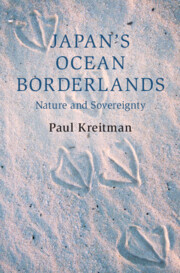‘Working in the eye-opening field of ‘political ecology,’ Kreitman shows how exploiting nature and conserving it both serve to ‘perform’ sovereignty.’
Andrew J. Nathan
Source: Foreign Affairs
‘An entertaining and enlightening book.’
Bill Hayton
Source: Asian Affairs
‘After reading this book, the reader can grasp the fluidity that surrounds these territories, invisible at a bird’s-eye view. Their sovereignty, resources, and even geography and natural features have changed over time, influenced by both the oceanic environment and human activity.’
Beatriz Martinez-Rius
Source: H-Net
‘The book’s overall significance lies in its exploration of the role of the environment in geopolitical and imperial history, particularly in the context of Japan’s oceanic territories. It provides a unique perspective on how ecological considerations can influence territorial claims, and the interplay between environmental conservation and national sovereignty.’
Niki J. P. Alsford
Source: International Journal of Maritime History
‘Scholars of Japanese history will find Kreitman’s arguments about the importance of bird islands and Japan’s Pacific borderlands to Japanese imperial politics and identity to be engaging and perhaps surprising … Anyone working in maritime history will appreciate Kreitman’s contributions to exploring the biopolitics of extraction, empire, and conservation … Finally, Kreitman’s prose is engaging, and he explains his important ideas clearly. His writing style is accessible enough to attract the attention of anyone in the reading public interested in histories of nature, maritime exploitation, the Pacific, or Japanese empire. The book is a valuable addition to the scholarship on colonial Asia as well as oceanic history.’
David J. McCaskey
Source: H-Net Reviews
‘An important read for scholars of Pacific history, environmental history, and Empire studies.’
Nathan Samayo
Source: Journal of Pacific History
‘Paul Kreitman has given us a granular understanding of modern Japan’s island engagements across a vast stretch of oceanic space. One looks forward to what he will illuminate next.’
Kären Wigen
Source: Journal of Japanese Studies



